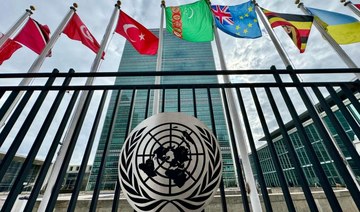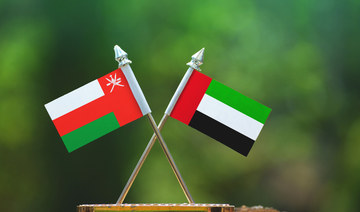WASHINGTON: The House approved a $1.9 trillion pandemic relief bill early Saturday in a win for President Joe Biden, even as top Democrats tried assuring agitated progressives that they’d revive their derailed drive to boost the minimum wage.
The new president’s vision for flushing cash to individuals, businesses, states and cities battered by COVID-19 passed on a near party-line 219-212 vote. That ships the massive measure to the Senate, where Democrats seem bent on resuscitating their minimum wage push and fights could erupt over state aid and other issues.
Democrats said the still-faltering economy and the half-million American lives lost demanded quick, decisive action. GOP lawmakers, they said, were out of step with a public that polling shows largely views the bill favorably.
“I am a happy camper tonight,” Rep. Maxine Waters, D-Calif., said Friday. “This is what America needs. Republicans, you ought to be a part of this. But if you’re not, we’re going without you.”
Republicans said the bill was too expensive and said too few education dollars would be spent quickly to immediately reopen schools. They said it was laden with gifts to Democratic constituencies like labor unions and funneled money to Democratic-run states they suggested didn’t need it because their budgets had bounced back.
“To my colleagues who say this bill is bold, I say it’s bloated,” said House Minority Leader Kevin McCarthy, R-Calif. “To those who say it’s urgent, I say it’s unfocused. To those who say it’s popular, I say it is entirely partisan.”
That divide is making the fight a showdown over which party voters will reward for heaping more federal spending to combat the coronavirus and revive the economy atop the $4 trillion approved last year.
The battle is also emerging as an early test of Biden’s ability to hold together his party’s fragile congressional majorities — just 10 votes in the House and an evenly divided 50-50 Senate.
At the same time, Democrats were trying to figure out how to assuage progressives who lost their top priority in a jarring Senate setback Thursday.
That chamber’s nonpartisan parliamentarian, Elizabeth MacDonough, said Senate rules require that a federal minimum wage increase would have to be dropped from the COVID-19 bill, leaving the proposal on life support. The measure would gradually lift that minimum to $15 hourly by 2025, doubling the current $7.25 floor in effect since 2009.
Hoping to revive the effort in some form, Senate Majority Leader Chuck Schumer, D-N.Y., is considering adding a provision to the Senate version of the COVID-19 relief bill that would penalize large companies that don’t pay workers at least $15 an hour, said a senior Democratic aide who spoke on condition of anonymity to discuss internal conversations.
That was in line with ideas floated Thursday night by Sens. Bernie Sanders, I-Vermont, a chief sponsor of the $15 plan, and Senate Finance Committee Chair Ron Wyden, D-Oregon, to boost taxes on corporations that don’t hit certain minimum wage targets.
House Speaker Nancy Pelosi, D-Calif., offered encouragement, too, calling a minimum wage increase “a financial necessity for our families, a great stimulus for our economy and a moral imperative for our country.” She said the House would “absolutely” approve a final version of the relief bill because of its widespread benefits, even if it lacked progressives’ treasured goal.
While Democratic leaders were eager to signal to rank-and-file progressives and liberal voters that they would not yield on the minimum wage fight, their pathway was unclear because of GOP opposition and questions over whether they had enough Democratic support.
House Ways and Means Committee Chair Richard Neal, D-Mass., sidestepped a question on taxing companies that don’t boost pay, saying of Senate Democrats, “I hesitate to say anything until they decide on a strategy.”
Progressives were demanding that the Senate press ahead anyway on the minimum wage increase, even if it meant changing that chamber’s rules and eliminating the filibuster, a tactic that requires 60 votes for a bill to move forward.
“We’re going to have to reform the filibuster because we have to be able to deliver,” said Rep. Pramila Jayapal, D-Washington, a progressive leader.
Rep. Alexandria Ocasio-Cortez, D-N.Y., another high-profile progressive, also said Senate rules must be changed, telling reporters that when Democrats meet with their constituents, “We can’t tell them that this didn’t get done because of an unelected parliamentarian.”
Traditionalists of both parties — including Biden, who served as a senator for 36 years — have opposed eliminating filibusters because they protect parties’ interests when they are in the Senate minority. Biden said weeks ago that he didn’t expect the minimum wage increase to survive the Senate’s rules.
Pelosi, too, seemed to shy away from dismantling Senate procedures, saying, “We will seek a solution consistent with Senate rules, and we will do so soon.”
The House COVID-19 bill includes the minimum wage increase, so the real battle over its fate will occur when the Senate debates its version over the next two weeks.
The overall relief bill would provide $1,400 payments to individuals, extend emergency unemployment benefits through August and increase tax credits for children and federal subsidies for health insurance.
It also provides billions for schools and colleges, state and local governments, COVID-19 vaccines and testing, renters, food producers and struggling industries like airlines, restaurants, bars and concert venues.
Democrats are pushing the relief measure through Congress under special rules that will let them avoid a Senate GOP filibuster, meaning that if they are united they won’t need any Republican votes.
It also lets the bill move faster, a top priority for Democrats who want the bill on Biden’s desk before the most recent emergency jobless benefits end on March 14.
But those same Senate rules prohibit provisions with only an “incidental” impact on the federal budget because they are chiefly driven by other policy purposes. MacDonough decided that the minimum wage provision failed that test.
Republicans oppose the $15 minimum wage target as an expense that would hurt businesses and cost jobs.
House passes $1.9tn pandemic relief bill, sends it to Senate
https://arab.news/6w6wt
House passes $1.9tn pandemic relief bill, sends it to Senate
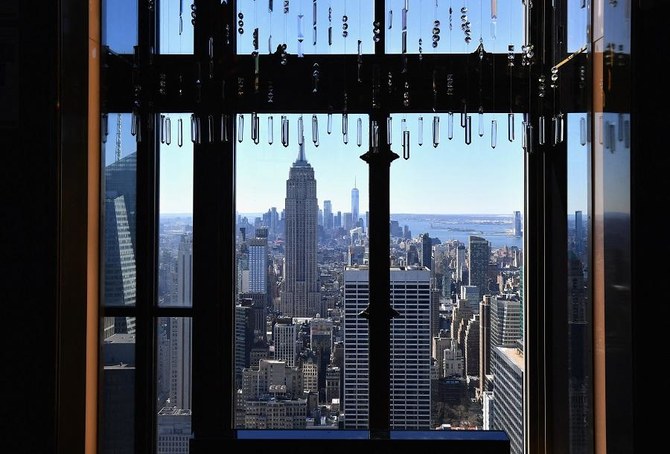
- Final passage appeared likely after the measure cleared a procedural hurdle by a partyline vote of 219 to 210.
Closing Bell: TASI edges down to close at 12,254 points
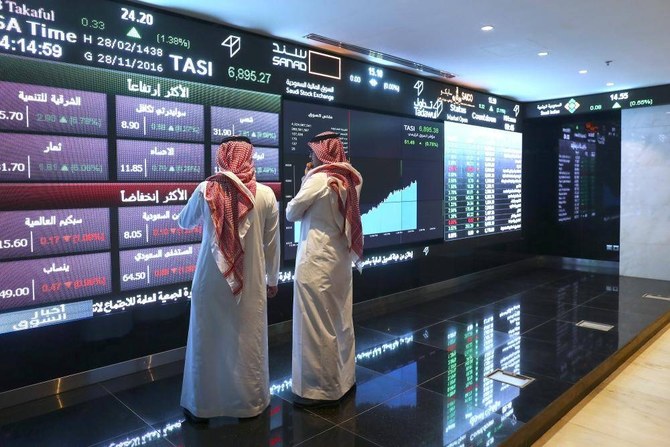
RIYADH: Saudi Arabia’s Tadawul All Share Index dipped on Thursday, losing 101.16 points, or 0.82 percent, to close at 12,254.53.
The total trading turnover of the benchmark index was SR6.9 billion ($1.84 billion) as 75 stocks advanced while 144 retreated.
Similarly, the MSCI Tadawul Index decreased by 8.99 points, or 0.58 percent, to close at 1,539.63.
The Kingdom’s parallel market, Nomu, increased, gaining 362.13 points, or 1.38 percent, to close at 26,688.25. This comes as 34 stocks advanced while as many as 27 retreated.
The best-performing stock of the day was Fawaz Abdulaziz Alhokair Co. The company’s share price surged by 6.39 percent to SR11.32.
Other top performers include Etihad Atheeb Telecommunication Co. and Saudi Cable Co., whose share prices soared by 5.57 percent and 5.35 percent, to stand at SR125and SR74.8 respectively. National Metal Manufacturing and Casting Co. and Saudi Steel Pipe Co. also fared well.
The worst performer was Al Sagr Cooperative Insurance Co., whose share price dropped by 7.11 percent to SR33.30.
ACWA Power as well as Bawan Co., did not perform well as their share prices dropped by 6.87 percent and 5.78 percent to stand at SR420 and SR44, respectively.
On the announcements front, a general assembly of Bank AlJazira approved increasing the capital by SR2.05 billion, representing a 25 percent increase.
This growth will be achieved through the capitalization of a portion of the statutory reserves, granting one share for every four shares to strengthen the bank’s capital base and enable it to achieve its strategic objectives, according to Al-Ekhbariya.
Additionally, authorization was granted to the board of directors to distribute interim dividends on a semi-annual/quarterly basis for the fiscal year 2024. Approval was also given to the compensation and benefits policy for senior executives at Bank AlJazira.
Moreover, the profits of Banque Saudi Fransi rose to SR1.15 billion during the first quarter of 2024, a 7 percent increase compared to the same period in 2023, which stood at SR1.07 billion.
The bank attributed this growth to a rise in commission income by 27.5 percent, primarily due to higher returns on financing and investments. However, there was a slight decrease in net commission income by 0.3 percent due to an increase in specific commission expenses.
Additionally, total operating expenses decreased 6.2 percent, mainly due to a reduction in the provision for expected credit losses on loans and advances. This was partially offset by an increase in the provision for other financial assets and rising staff salaries and expenses.
On another note, the stock of Al-Rajhi Co. for Cooperative Insurance SJSC, Al Rajhi Takaful, which is counted for in the insurance sector on the main market, recorded its highest price since listing on April 25, at SR142.
Furthermore, Saudi Exchange approved the listing request for government debt instruments issued by Saudi Arabia, totaling SR5.1 billion.
These instruments comprise issuance number 2024-04-07, valued at SR1.6 billion, and 2024-04-12, valued at SR3.5 billion. Trading of these instruments will commence on April 29.
Additionally, Rawabi Holding Co., also referred to as Rawabi, has successfully concluded its largest Saudi Riyal-denominated sukuk issuance, totaling SR1.2 billion. Driven by high market demand, this milestone surpasses Rawabi’s previous issuance record of SR875 million in 2023.
Since the launch of its sukuk program in 2020, Rawabi Holding has issued approximately SR6.5 billion across 18 tranches and redeemed seven tranches totaling around SR2.9 billion.
Rapid expansion of batteries crucial to meet COP28 climate goals: IEA

RIYADH: Global battery production must be scaled up to meet the climate security goals set at COP28, according to the International Energy Agency.
In its latest report, IEA said battery technology witnessed unprecedented growth in 2023, outstripping almost all other clean power source solutions.
The think tank added that an expected sharp fall in battery costs will accelerate the shift to renewable energy from fossil fuels in the coming years.
“Growth in batteries outpaced almost all other clean energy technologies in 2023 as falling costs, advancing innovation and supportive industrial policies helped drive up demand for a technology that will be critical to delivering the climate and energy targets outlined at the COP28 climate conference in Dubai,” said IEA in the report.
It added: “After their deployment in the power sector more than doubled last year, batteries need to lead a sixfold increase in global energy storage to enable the world to meet 2030 targets.”
During the COP28 summit, nearly 200 countries agreed to triple renewable energy capacity by 2030, double the pace of power source efficiency improvements, and transition away from fossil fuels.
The report added that 1,500 gigawatts of battery storage would be required to triple renewable capacity globally by the end of this decade.
However, IEA warned that a shortfall in deploying enough batteries could stall clean energy transitions in the power sector.
Battery manufacturing
According to IEA, battery manufacturing has more than tripled in the last three years, with China accounting for 83 percent of current production capacity, up from 75 percent in 2020.
The report added that 40 percent of announced plans for new battery manufacturing are in advanced economies such as the US and EU.
“If all those projects are built, those economies would have nearly enough manufacturing to meet their own needs to 2030 on the path to net zero emission,” said IEA.
In the earlier days, the most common type of batteries, those based on lithium-ion, were typically associated with consumer electronics. However, today, the energy sector accounts for over 90 percent of overall battery demand, said the report.
The intergovernmental organization added that battery deployment in the power sector increased by more than 130 percent in 2023 compared to the previous year, adding a total of 42 GW.
Moreover, batteries have enabled electric car sales to surge from 3 million in 2020 to almost 14 million last year in the transport sector.
Earlier in April, another report by IEA revealed that global sales of electric cars grew by approximately 25 percent in the first quarter of this year compared to the same period in 2023.
“The electricity and transport sectors are two key pillars for bringing down emissions quickly enough to meet the targets agreed at COP28 and keep open the possibility of limiting global warming to 1.5 degrees Celsius, ” said Fatih Birol, IEA’s executive director.
He added: “Batteries will provide the foundations in both areas, playing an invaluable role in scaling up renewables and electrifying transport while delivering secure and sustainable energy for businesses and households.”
Falling costs
According to IEA, battery costs have fallen by over 90 percent in less than 15 years, one of the fastest declines ever seen in clean energy technologies.
However, the agency highlighted that costs must come down further without compromising quality and technology.
“The combination of solar PV (photovoltaic) and batteries is today competitive with new coal plants in India. And just in the next few years, it will be cheaper than new coal in China and gas-fired power in the US. Batteries are changing the game before our eyes,” said Birol.
According to IEA, ensuring energy security also requires greater diversity in supply chains, including extracting and processing the critical minerals used in batteries.
Birol noted that governments worldwide have an important role in building resilient local and international supply chains to ensure that securely and sustainably produced batteries come to market at a reasonable cost.
“Legislation such as the Inflation Reduction Act in the US, the Net-Zero Industry Act in the EU, and the Production Linked Incentive in India are good examples of how policy can affect real change in the industry by backing technology manufacturing,” said Birol.
He also underscored the necessity to implement supportive policies to help speed up deployment by minimizing barriers to market entry for developers and reducing red tape that can stifle new projects.
Key to energy transition
In its report, IEA also highlighted the versatility of battery storage to ensure clean energy transition.
“In the power sector, batteries help smooth out the variability of renewable electricity from technologies such as wind and solar,” said the agency.
IEA added that battery storage can alleviate grid congestion in times of high supply, offering an outlet to capture and store excess renewable electricity that would otherwise be lost.
“Reducing emissions and getting on track to meet international energy and climate targets will hinge on whether the world can scale up batteries fast enough. More than half the job that we need to do will rely, at least in some part, on battery deployment,” added Birol.
Moreover, batteries can also provide critical service in the case of emergencies caused by extreme weather or other disruptions.
The deployment of batteries will also provide the grid with highly technical services, such as voltage and frequency control, that can help system operators and provide access to people who lack electricity.
“In a pathway to achieving universal energy access worldwide by 2030, they help 400 million people in emerging and developing economies gain electricity access through decentralized solutions like solar home systems and mini-grids with batteries,” IEA concluded.
More than two-thirds of UAE retail investors hold stocks in AI companies: eToro survey

RIYADH: More than 70 percent of retail investors in the UAE have stocks of companies developing artificial intelligence, according to a survey by trading platform eToro.
The 71 percent mark underscores a widespread understanding of AI’s potential as a catalyst for innovation and a source of competitive edge.
UAE retail investors’ interest in AI goes beyond holding stocks. When asked about their use or plans to use AI tools like ChatGPT to guide investment decisions, 39 percent reported that they already employ these technologies.
Global Markets Strategist at eToro, Ben Laidler, said: “Microsoft’s recent $1.5 billion investment in Abu Dhabi’s G42 is a big endorsement of the UAE’s potential as a global AI hub, which is reflected in the survey results showing widespread AI adoption by local investors and consumers.”
Millennials lead the charge when it comes to generational users, with 40 percent of those aged 25-44 using AI tools.
Baby Boomers and Gen X investors follow closely, with 39 percent and 38 percent, respectively.
Underlining the critical role that artificial intelligence might play in future investment strategies, an additional 52 percent of respondents, beyond those already using AI tools, said they are willing to adopt the technology to guide or adjust their portfolios in the future.
This trend defies generational stereotypes, with the older cohorts of investors directing the charge.
Baby Boomers lead in interest in integrating AI into investment planning, with 60 percent showing enthusiasm, followed by Gen X at 58 percent.
Laidler said: “AI stocks were the performance juggernauts of 2023, leading the tech sector revival and propelling the S&P 500 into bull market territory. AI trends helped make NVIDIA and Meta the best S&P 500 stock performers of last year, with their share prices tripling.”
He added: “Whilst we’re unlikely to see a repeat performance in 2024, the benefits of AI’s rapid adoption are broadening across the stock market and economy as it rapidly moves from hype to reality.”
Furthermore, eToro analyzed which companies experienced the highest proportional increase in UAE-based investors on its platform from quarter to quarter, revealing that AI stocks were the most popular theme during the first three months of the year.
Omani officials forge economic alliances with Saudi Arabia, Japan, and US

RIYADH: Oman’s industrial infrastructure is set to receive a boost following a new agreement with Saudi Arabia, fostering private sector participation in the country’s economic growth.
A memorandum of understanding, aimed at financing the infrastructure of several industrial zones in Oman, was signed during a meeting between Minister of Finance Sultan bin Salem Al-Habsi and Sultan Abdulrahman Al-Marshad, CEO of the Saudi Fund for Development, the Oman News Agency reported.
Discussions centered on cooperation mechanisms between Oman and the fund, along with updates on collaborative development projects.
The aim is to develop the industrial and logistical sectors by providing all necessary basic services, thereby encouraging the private sector to contribute to Oman’s economic development in line with Oman Vision 2040, as reported by the agency.
This memorandum falls within the framework of cooperation between the two parties to support developmental areas in Oman. These encompass infrastructure, higher and vocational education programs, and water, along with the industry and mining sectors. Additionally, it includes transportation and communications sectors, as well as developmental projects in the energy sector.
On another note, Ali bin Masoud Al-Sunaidi, chairman of the Public Authority for Special Economic Zones and Free Zones, met with Ken Saito, minister of economy, trade and industry of Japan, and his accompanying delegation in Tokyo.
During the meeting, they reviewed the business cooperation between the two countries and the major projects under construction in the economic and free zones and industrial cities in Oman, notably the low-carbon iron production project in the Special Economic Zone in Duqm.
The visit also included meetings with officials from companies engaged in iron and its derivatives production, and renewable energy equipment manufacturing companies, as well as a visit to Yokohama Port to learn about its experience in receiving ships specialized in energy and petroleum product transportation.
Also on April 24, Oman and the US explored ways to enhance trade, investment, and address challenges comprehensively during the second strategic dialogue held in Washington.
The Omani side was chaired by Sheikh Khalifa bin Ali bin Issa al-Harthy, undersecretary for Diplomatic Affairs, Ministry of Foreign Affairs, while the US side was chaired by Jose Fernandez, undersecretary of state for Economic Growth, Energy, and the Environment.
Both sides discussed opportunities for American companies in Oman, focusing on ICT, semiconductors, and clean energy services, expressing commitment to enhancing cooperation in clean energy solutions and mineral investments.
They addressed environmental priorities under the Omani-American cooperation memorandum, fostering communication between researchers from both countries for clean energy research.
Saudi NHC, Spain’s Urbas to construct almost 600 housing units in Al-Fursan suburb
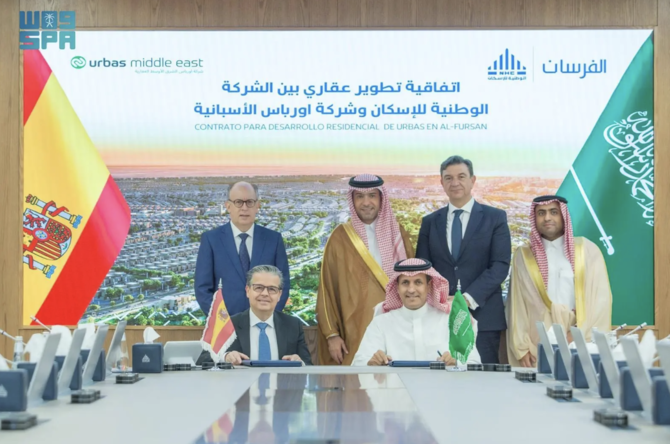
RIYADH: Saudi Arabia’s Al-Fursan suburb will soon be home to 589 new residential units worth around SR1 billion ($266 million) thanks to a deal sealed by the National Housing Co.
Inked with Urbas Middle East Real Estate Co., a subsidiary of the Spanish Urbas Group, the agreement involves the development as well as construction of the housing units on an area spanning 150,000 sq. m, the Saudi Press Agency reported.
This collaboration marks a significant milestone in the development of the Al-Fursan suburb. It also promises to set new standards in property development.
“This agreement complements the efforts of the recent visit to Spain and continues to attract international investments with major companies to provide various housing products that fulfill and meet the desires of citizens,” Saudi Minister of Municipal and Rural Affairs and Housing Majid Al-Hogail said in a post on X.
“As an extension of our journey in attracting the best international experiences and expertise in the real estate development industry, I was pleased to meet the CEO of the Spanish company Urbas, which is planned to be one of the companies developing the Al-Fursan neighborhood project in Riyadh,” Al-Hogail added.
The minister also highlighted how this step will contribute to providing innovative housing options and facilitate the exchange of experiences between Saudi and international developers.
Moreover, NHC has also revealed the sale of 1,300 residential units within Al-Fursan in the first quarter of 2024, generating a total value exceeding SR1.5 billion.
This accomplishment emphasizes the firm’s keenness in creating vibrant, quality living spaces that meet and exceed the expectations of modern residents.
Al-Fursan, known as one of the largest urban development projects in the region, is designed to align with the Kingdom’s Vision 2030.
The suburb covers an area of 35 million sq. m. and is set to feature over 50,000 housing units, accommodating more than 250,000 residents.
It is equipped with over 190 crucial facilities, including educational, healthcare, and recreational services, all surrounded by more than 6 million sq. m. of green spaces. This widespread greenery is part of a broader initiative to further elevate the living environment and contribute to the Saudi Green Initiative by planting over half a million trees.
Urbas Group has experience in over 20 countries with 30,000 residential units. Urbas Middle East plans to grow in Saudi Arabia, showing its commitment to global expansion.





